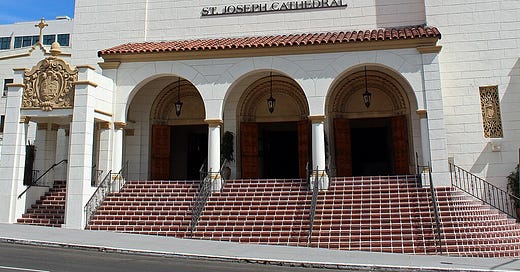The Diocese of San Diego’s Anti-Homeschool Policy Harms Catholic Communities
A new policy bans charter schools, homeschool programs, and private-school programs from using parish spaces.
When I was growing up in Connecticut, one of the highlights of each month was celebrating First Fridays at a local parish along with dozens of other homeschooling families. We’d gather for noon mass, enjoy a potluck lunch and do educational crafts in the parish hall, and play outside on the fields or swingsets in nice weather.
From now on in the Diocese of San Diego, group events such as these may no longer be possible for many families thanks to a new policy prohibiting homeschoolers and other private-school groups from using parish spaces for their programming. From The Pillar’s report on the new policy:
A newly issued policy in the Diocese of San Diego forbids homeschool groups from using space at area parishes, while allowing parishes to rent space to non-Catholic schools on a case-by-case basis. . . . A memo sent to parish and school administrators last week explained that “the use of parish facilities by charter schools, home school programs, or private school programs is prohibited, both because such usage can undermine the stability of nearby Catholic schools and lead people to think that the Church is approving and advancing particular alternative schools and programs.”
It isn’t clear from the policy language whether the ban applies to these groups meeting in parish spaces for fellowship or whether it is meant to apply only to when these groups have made arrangements to conduct co-ops or other schooling on church property.
Notably, however, the diocesan policy would allow groups of non-Catholics to use church buildings even for formal schooling: “If a parish has a closed school building which is creating economic hardship, rental of the school to a non-Catholic educational program or school will be considered on a case-by-case basis with approval by the Bishop, always emphasizing that there are no conflicts in its mission with Catholic doctrine and that such a rental will not harm neighboring Catholic schools.”
In essence, the diocese’s policy bans local Catholics and parishioners from using their own parish’s facilities if they happen to also send their children somewhere other than parish school — though again, notably, the policy would appear to allow some school groups to use these spaces provided that they aren’t homeschoolers or affiliated with a charter or private school. This is nothing short of discrimination against Catholics who decide to send their children neither to diocesan schools nor to standard public schools.
The diocesan memo includes two particularly noteworthy assertions that illuminate the troubling mindset undergirding the new policy: First, that “the purpose of parish facilities is to celebrate the good news of Jesus Christ and to serve the needs of the Catholic community” and second, that “parish run schools and religious education programs are the primary means by which the Church accomplishes its teaching mission for children and young people.”
As The Pillar points out, “homeschool enrollment increased by 78% across California between 2017 and 2023,” and “14.8% of students in the San Diego metro area [attended] private school in 2022, up from 10.7% in 2019.” Surely if some of the families representing this major shift are Catholics who would benefit from using space at a local parish to strengthen their school communities, it would “serve the needs of the Catholic community” for parishes to permit them to do so — unless, of course, these groups were somehow contradicting or undermining Church teaching, but the diocese’s blanket ban leaves no room for drawing any such distinctions.
Meanwhile, the notion that the Church “accomplishes its teaching mission” primarily through parish schools and religious education is ludicrous. The Church herself teaches that parents are the primary educators of their children and that the family is where the most important work of raising children in the faith occurs. In Gravissimum Educationis, a declaration on Christian education, Pope Paul VI writes:
Since parents have given children their life, they are bound by the most serious obligation to educate their offspring and therefore must be recognized as the primary and principal educators. This role in education is so important that only with difficulty can it be supplied where it is lacking. . . .
It is particularly in the Christian family, enriched by the grace and office of the sacrament of matrimony, that children should be taught from their early years to have a knowledge of God according to the faith received in Baptism, to worship Him, and to love their neighbor. Here, too, they find their first experience of a wholesome human society and of the Church.
While parish schools and religious-education programs often play an important complementary or supplementary role in this work, there is no basis in Catholic teaching for the notion that these institutions are the primary means of transmitting the faith to young people — indeed, the Church is emphatic that this is not the case. Not to mention that oftentimes Catholic families who choose alternative private schools or homeschooling do so precisely because diocesan schools have failed to provide adequate catechesis to their children.
Far from solidifying the important role of parishes and diocesan schools, the Diocese of San Diego’s new policy drives a wedge between Catholics seeking to build strong communities of faith and the local churches that are meant to serve and support them.


